Question 1 What should you do to raise a concern about a suspected ethics violation? Ask another colleague at KPMG to report your concern.
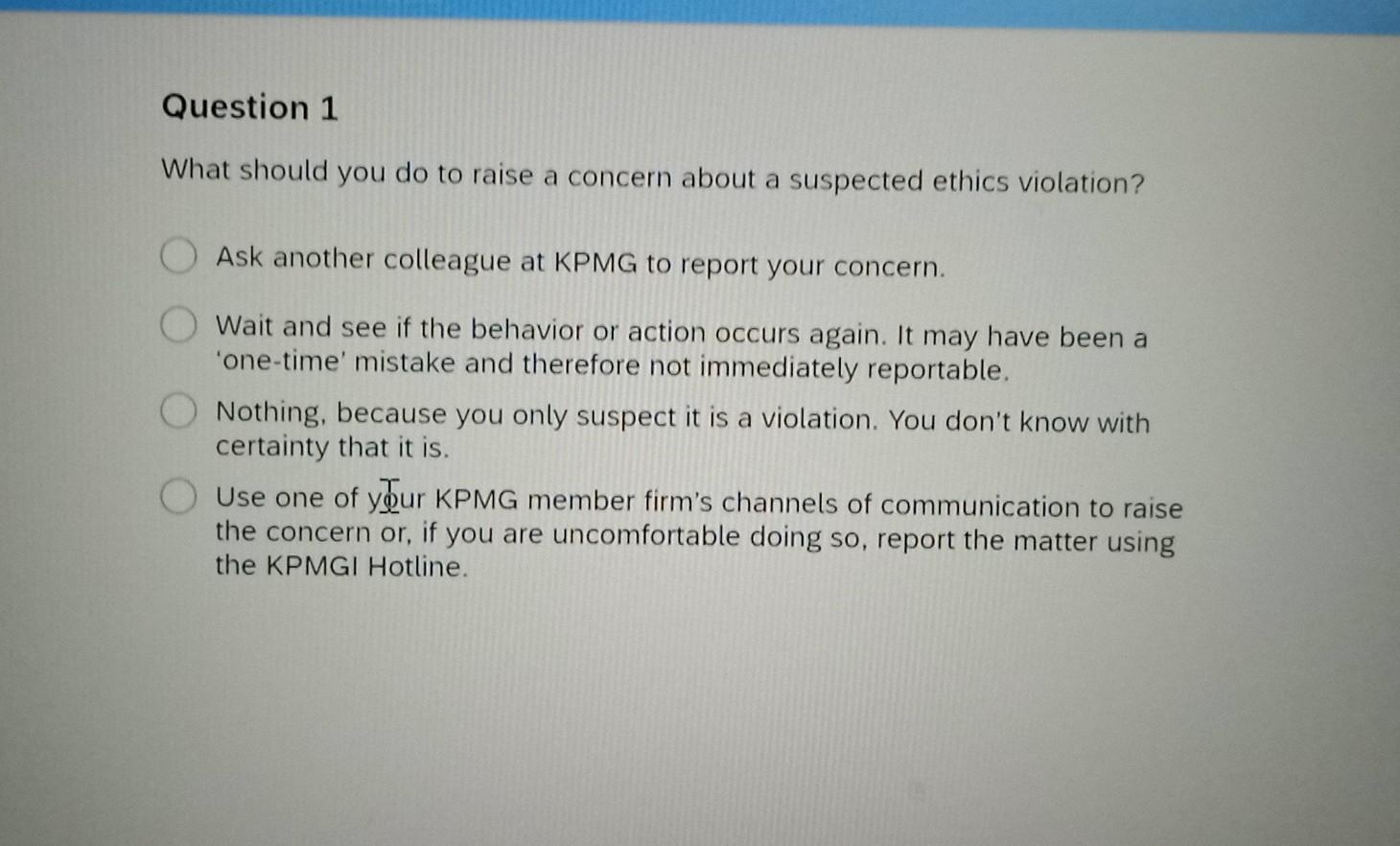
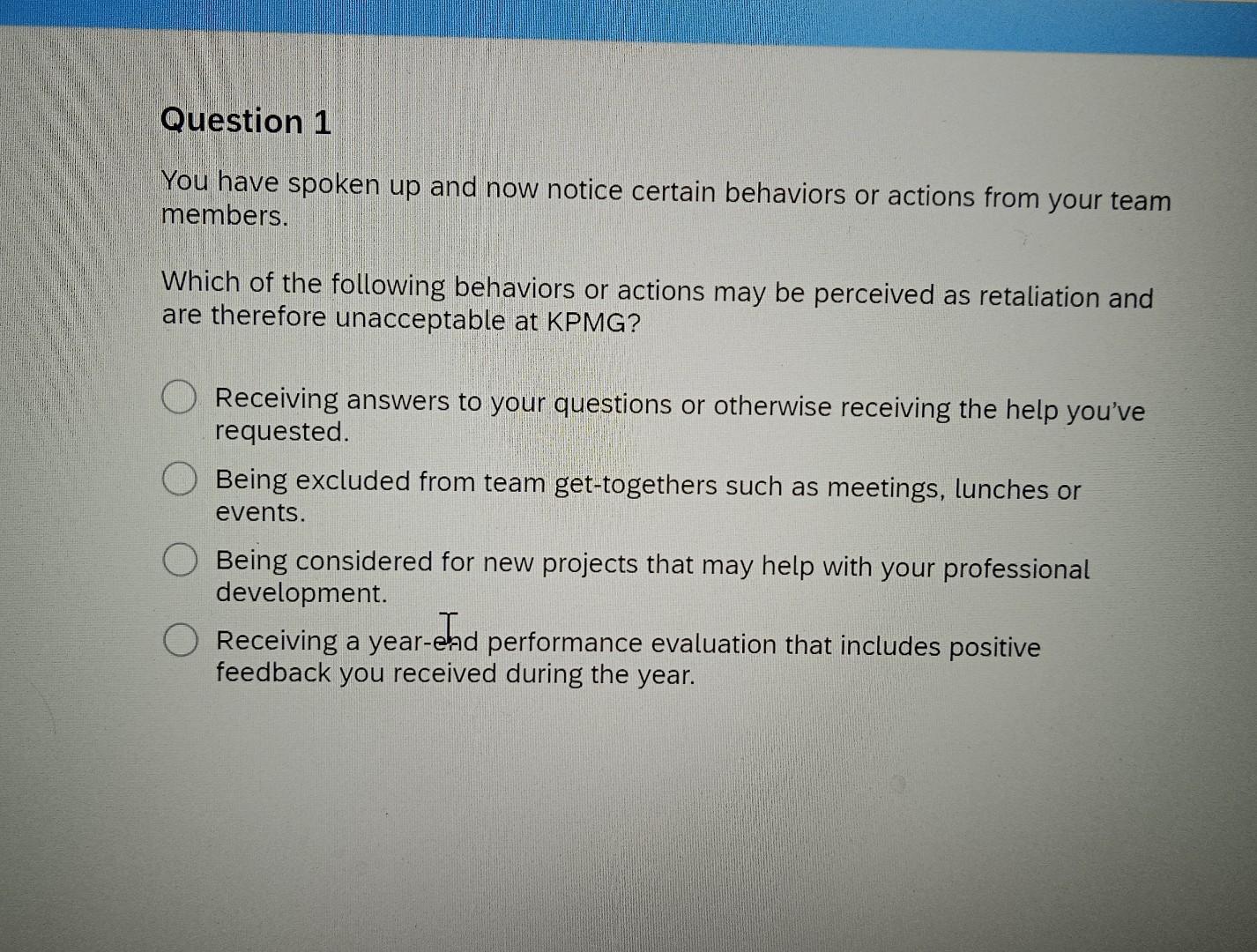
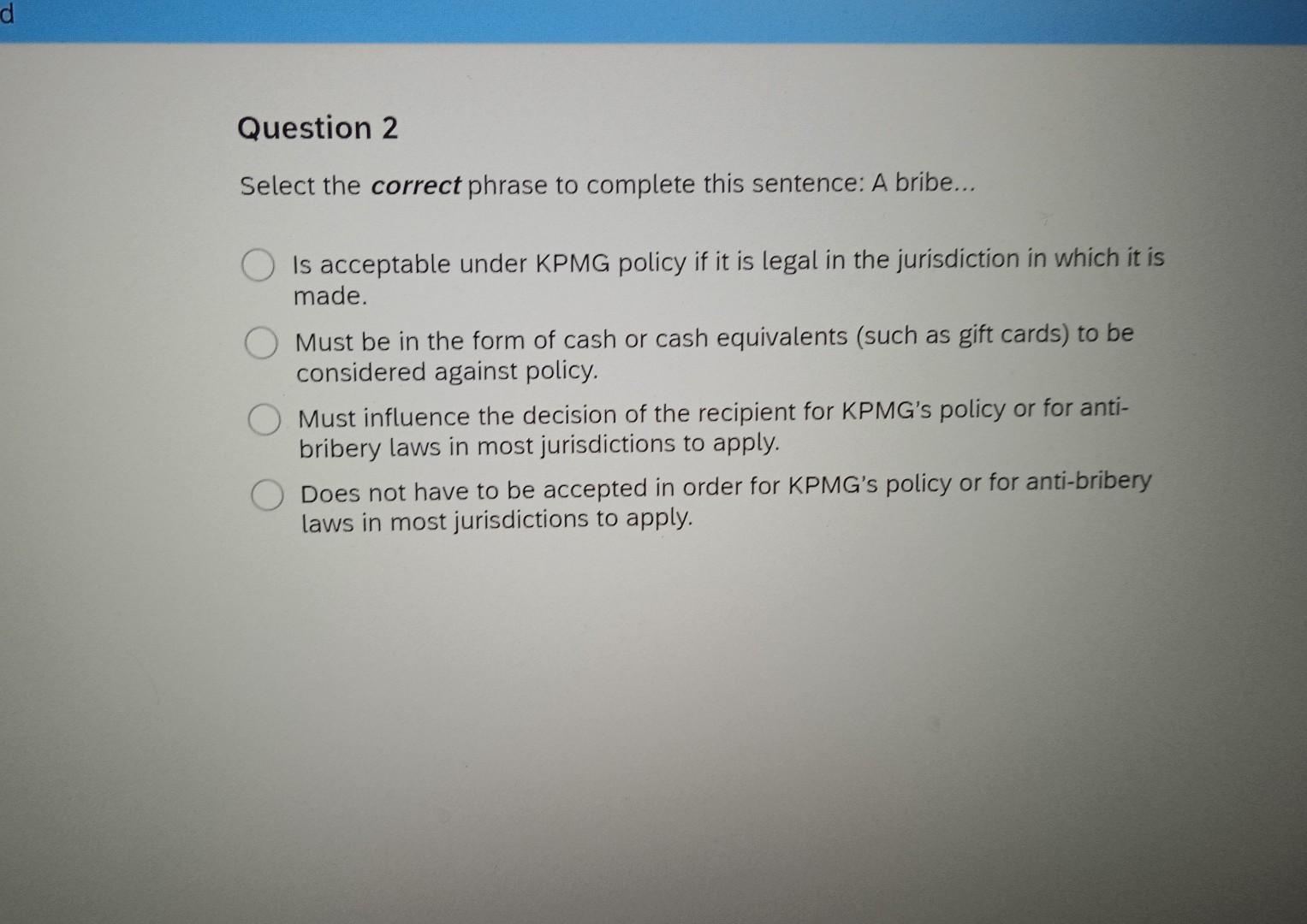
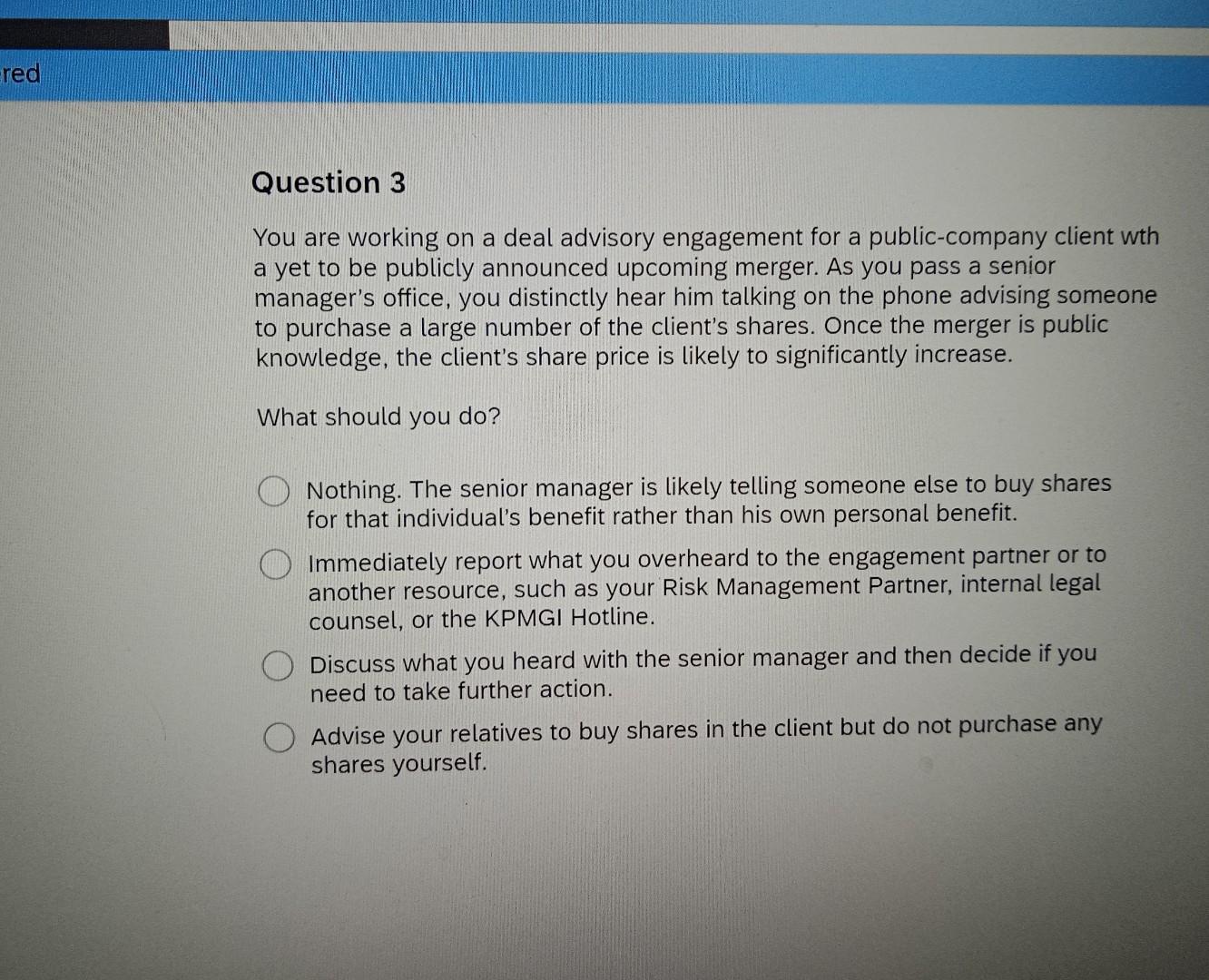
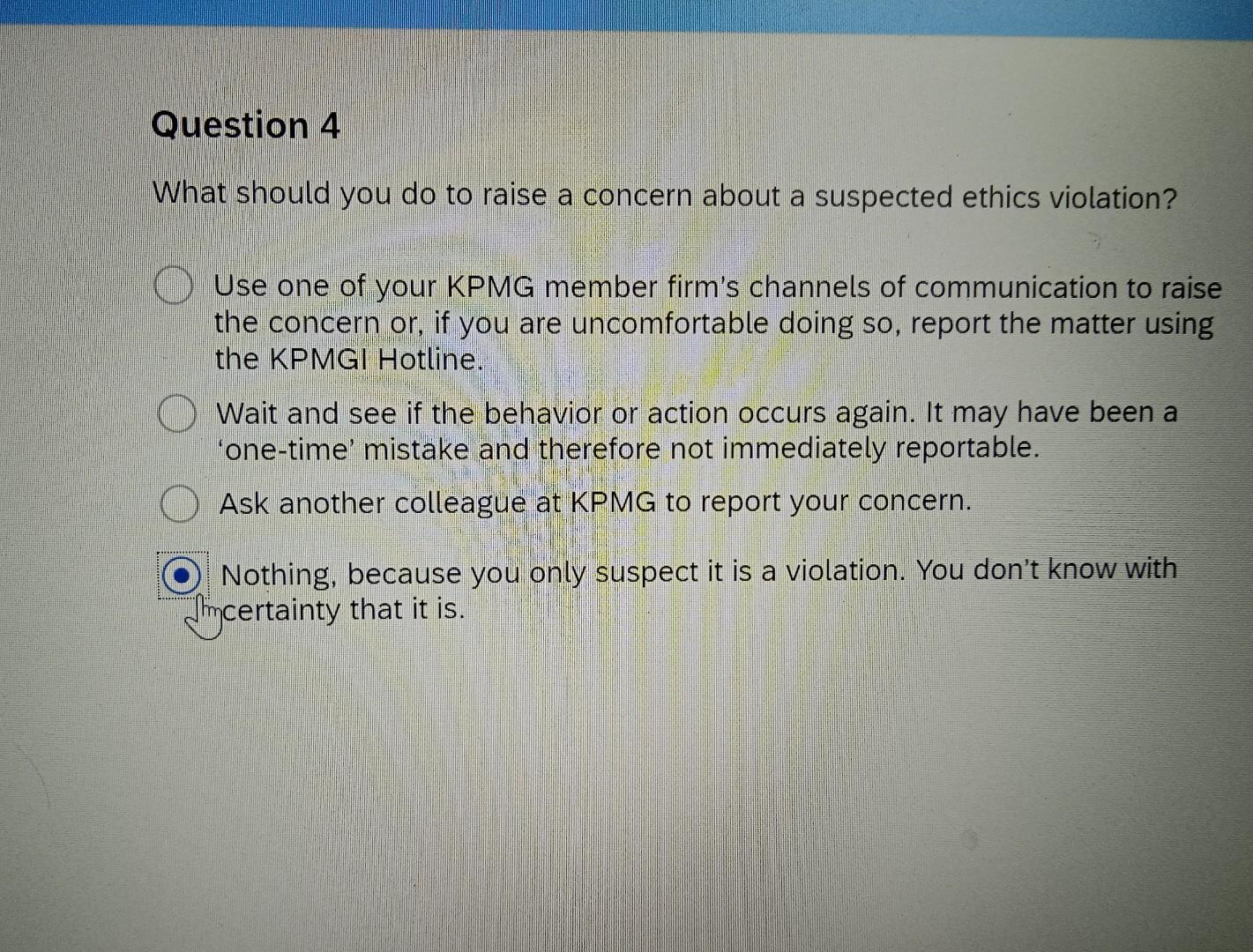
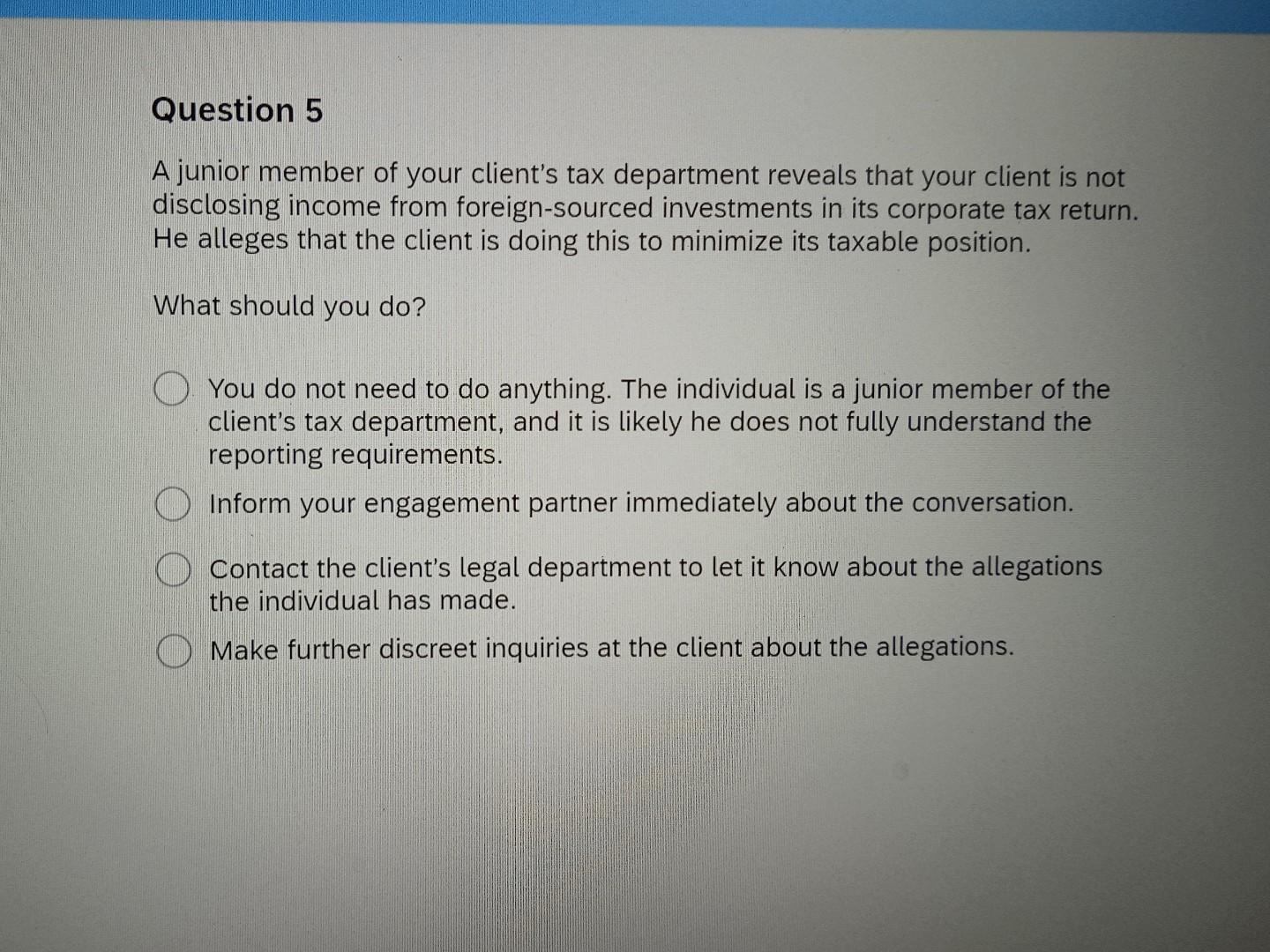
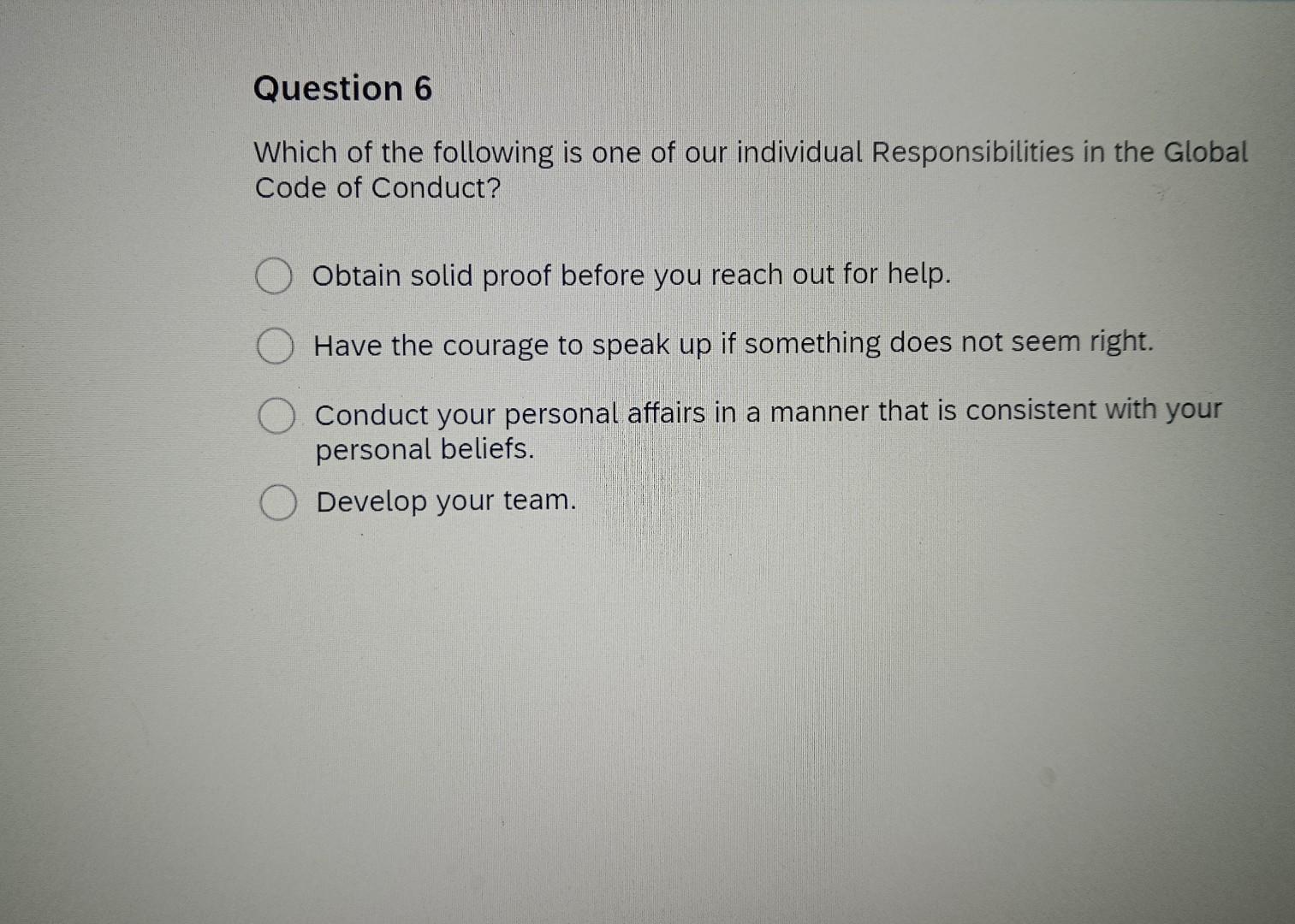
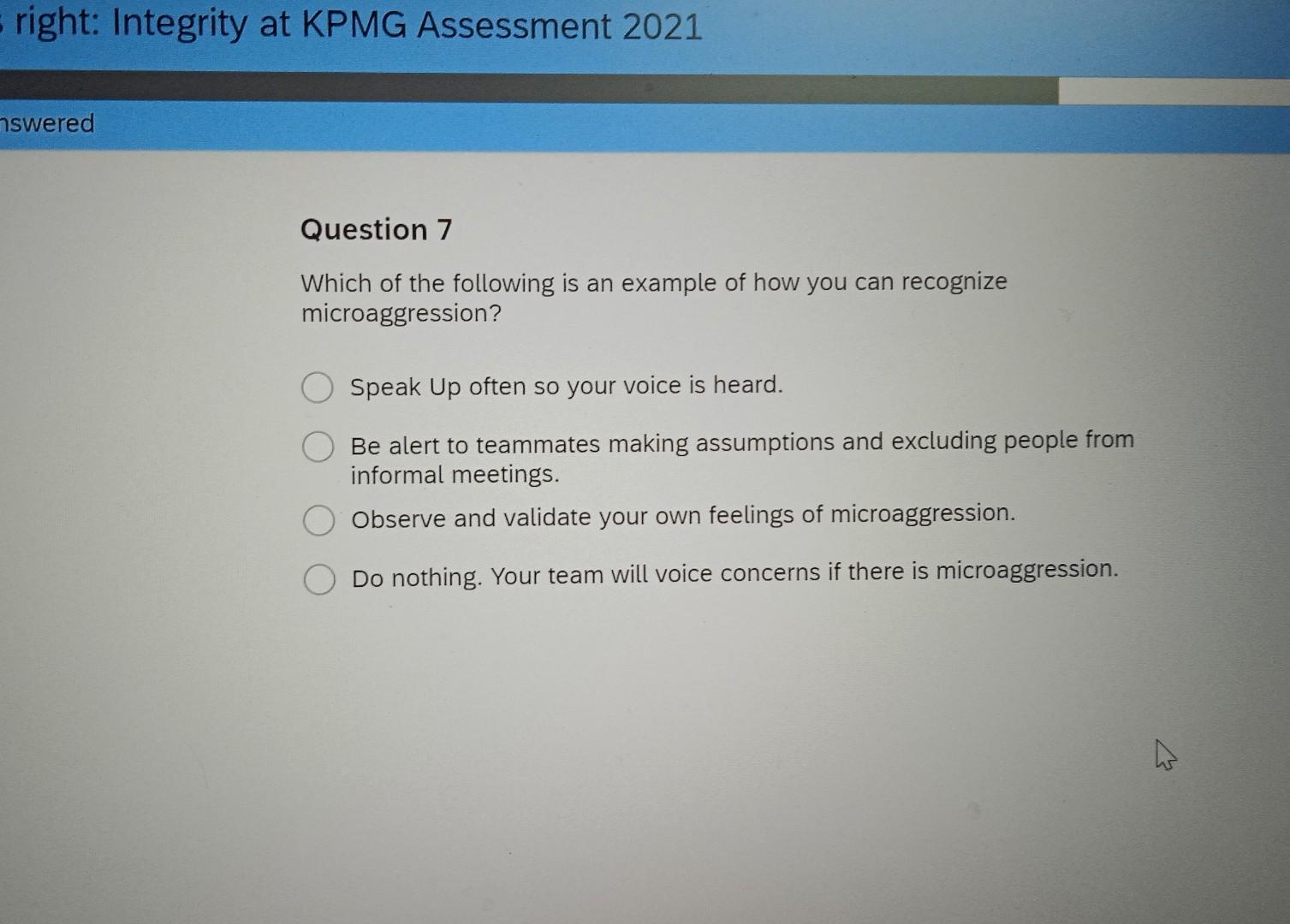
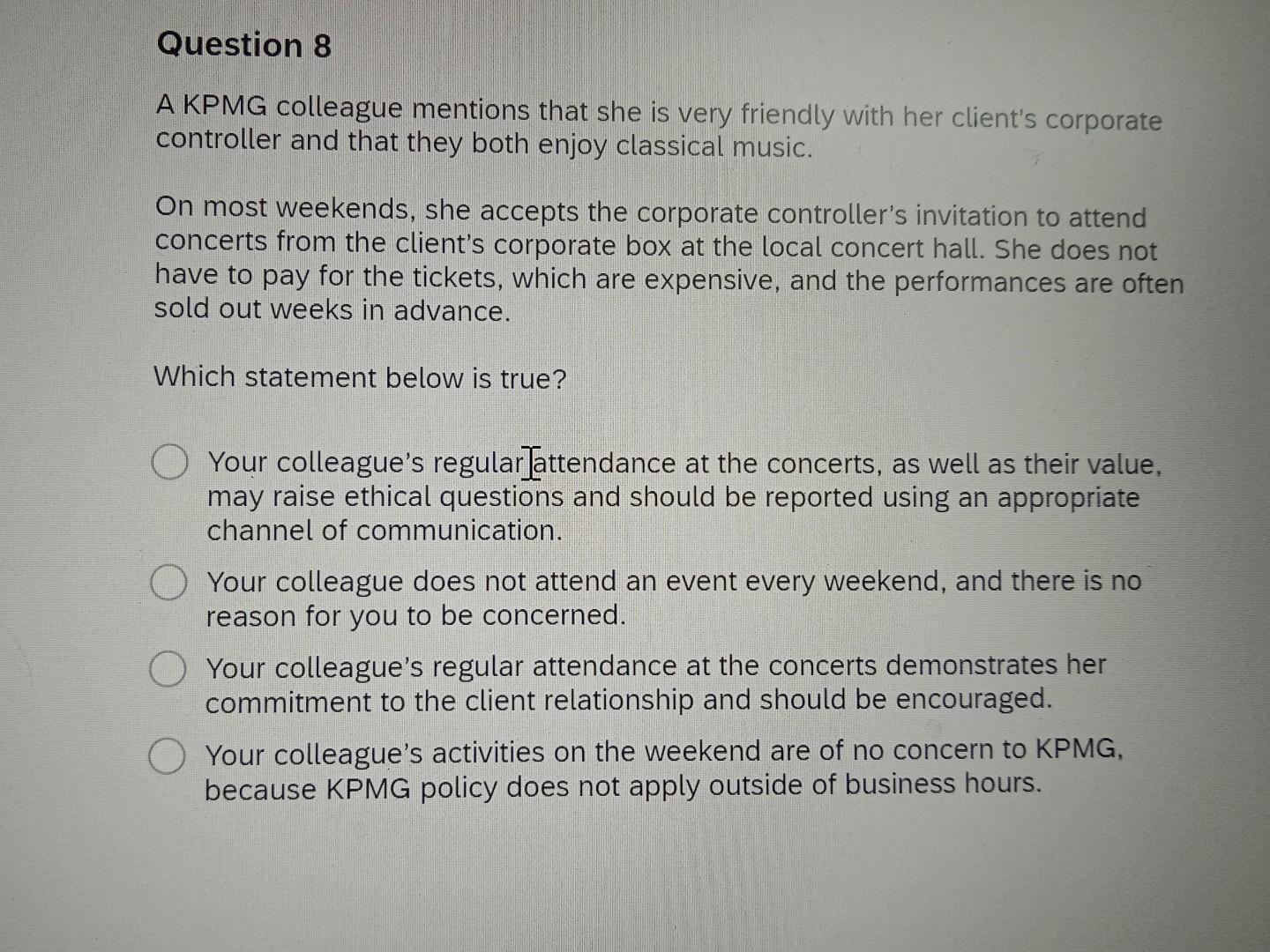
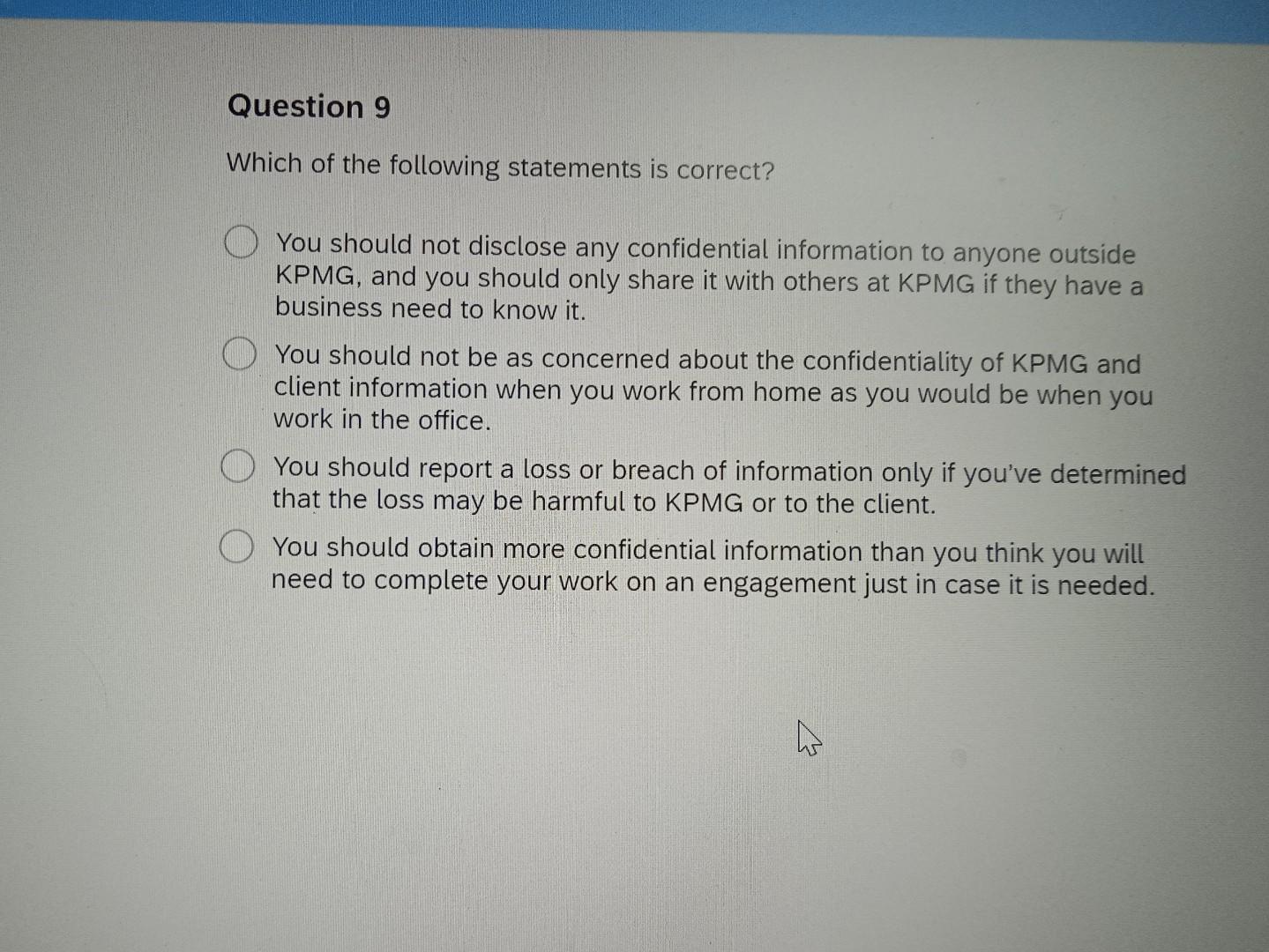
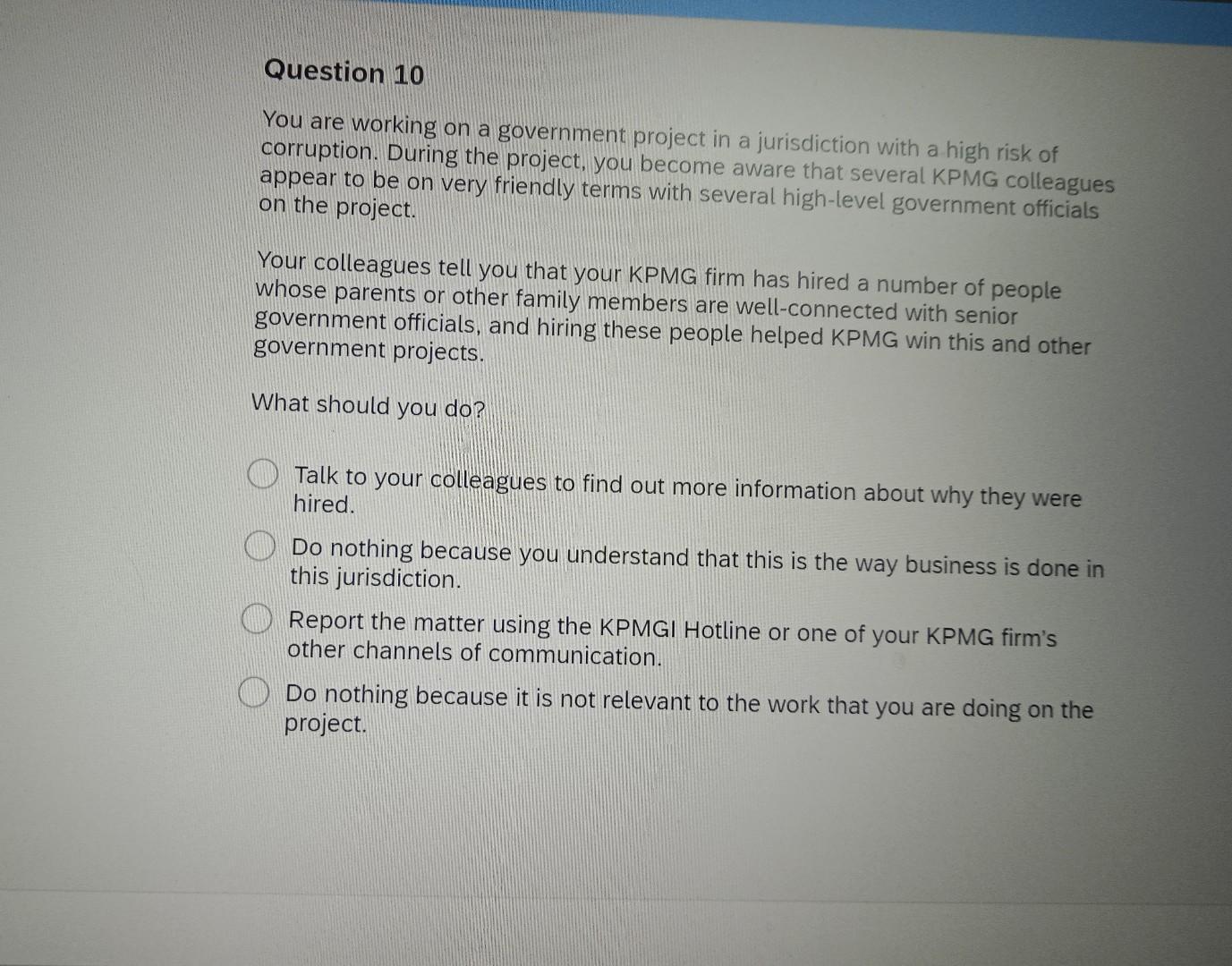
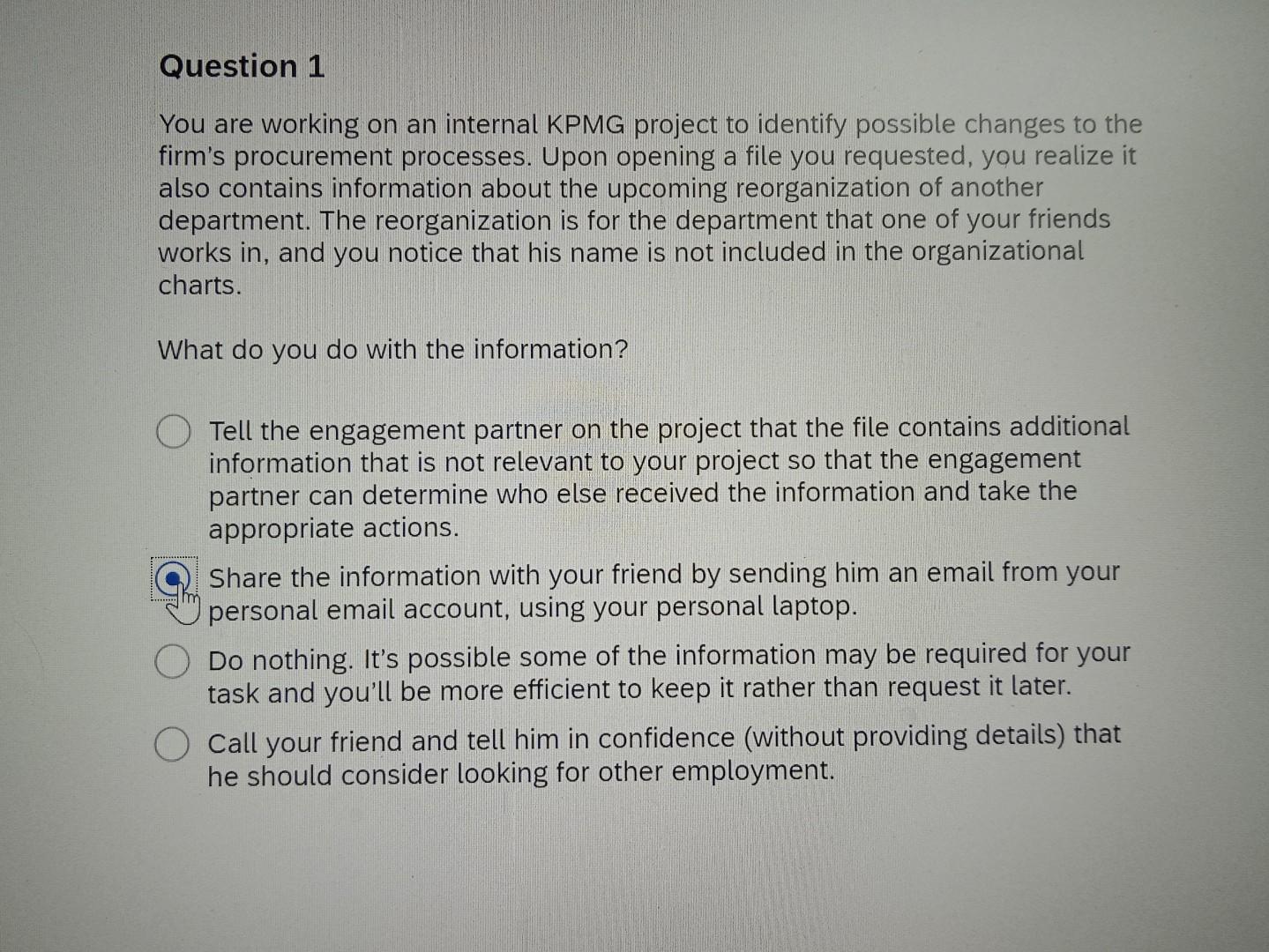
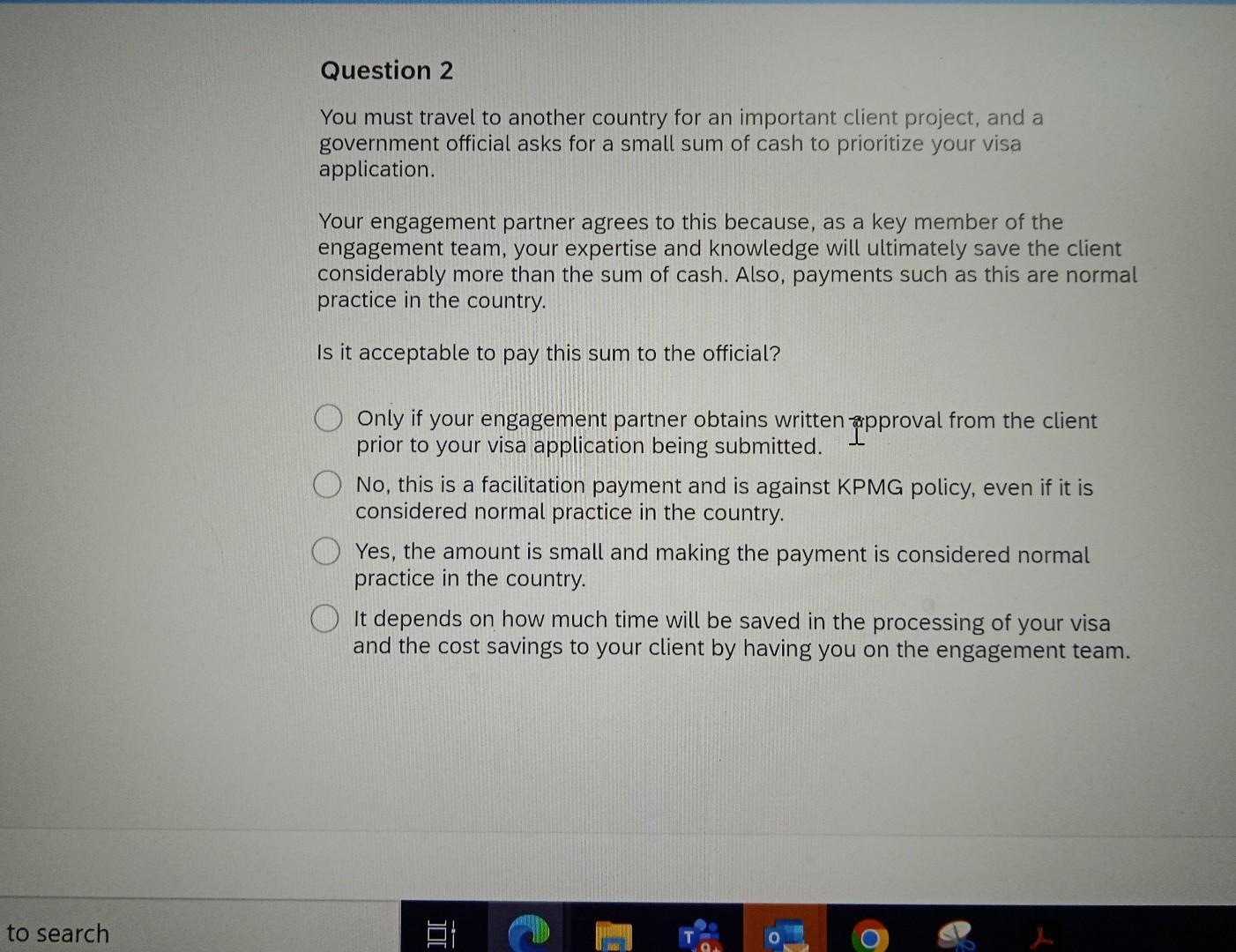
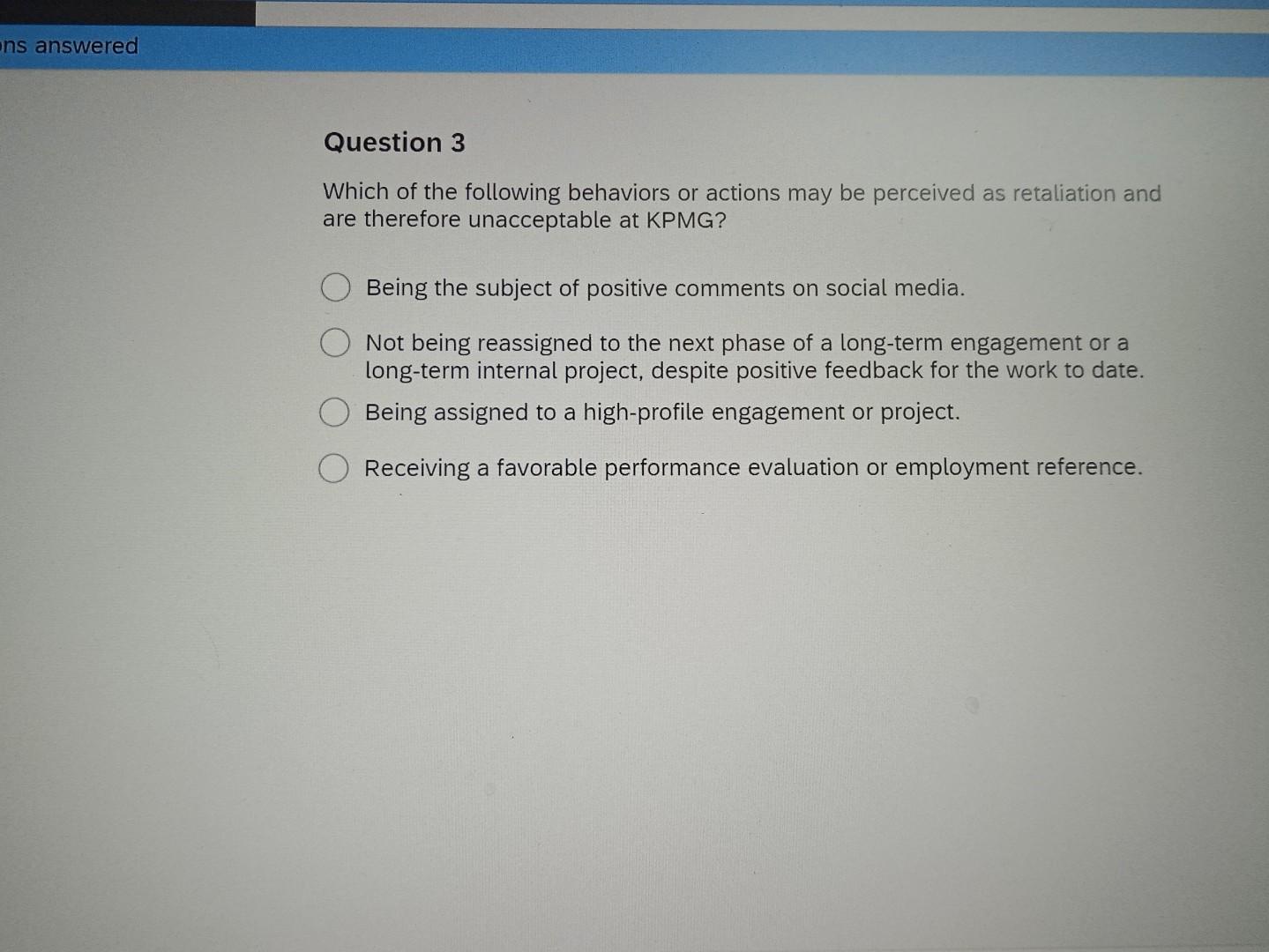
Question 1 What should you do to raise a concern about a suspected ethics violation? Ask another colleague at KPMG to report your concern. Wait and see if the behavior or action occurs again. It may have been a 'one-time' mistake and therefore not immediately reportable. Nothing, because you only suspect it is a violation. You don't know with certainty that it is. Use one of your KPMG member firm's channels of communication to raise the concern or, if you are uncomfortable doing so, report the matter using the KPMGI Hotline. Question 1 You have spoken up and now notice certain behaviors or actions from your team members. Which of the following behaviors or actions may be perceived as retaliation and are therefore unacceptable at KPMG? Receiving answers to your questions or otherwise receiving the help you've requested. Being excluded from team get-togethers such as meetings, lunches or events. Being considered for new projects that may help with your professional development. O Receiving a year-end performance evaluation that includes positive feedback you received during the year. Question 2 Select the correct phrase to complete this sentence: A bribe... Is acceptable under KPMG policy if it is legal in the jurisdiction in which it is made. Must be in the form of cash or cash equivalents (such as gift cards) to be considered against policy. Must influence the decision of the recipient for KPMG's policy or for anti- bribery laws in most jurisdictions to apply. Does not have to be accepted in order for KPMG's policy or for anti-bribery laws in most jurisdictions to apply. red Question 3 You are working on a deal advisory engagement for a public-company client wth a yet to be publicly announced upcoming merger. As you pass a senior manager's office, you distinctly hear him talking on the phone advising someone to purchase a large number of the client's shares. Once the merger is public knowledge, the client's share price is likely to significantly increase. What should you do? Nothing. The senior manager is likely telling someone else to buy shares for that individual's benefit rather than his own personal benefit. Immediately report what you overheard to the engagement partner or to another resource, such as your Risk Management Partner, internal legal counsel, or the KPMGI Hotline. Discuss what you heard with the senior manager and then decide if you need to take further action. Advise your relatives to buy shares in the client but do not purchase any shares yourself. Question 4 What should you do to raise a concern about a suspected ethics violation? Use one of your KPMG member firm's channels of communication to raise the concern or, if you are uncomfortable doing so, report the matter using the KPMGI Hotline. Wait and see if the behavior or action occurs again. It may have been a 'one-time' mistake and therefore not immediately reportable. Ask another colleague at KPMG to report your concern. Nothing, because you only suspect it is a violation. You don't know with Jmcertainty that it is. Question 5 A junior member of your client's tax department reveals that your client is not disclosing income from foreign-sourced investments in its corporate tax return. He alleges that the client is doing this to minimize its taxable position. What should you do? You do not need to do anything. The individual is a junior member of the client's tax department, and it is likely he does not fully understand the reporting requirements. Inform your engagement partner immediately about the conversation. Contact the client's legal department to let it know about the allegations the individual has made. Make further discreet inquiries at the client about the allegations. Question 6 Which of the following is one of our individual Responsibilities in the Global Code of Conduct? Obtain solid proof before you reach out for help. Have the courage to speak up if something does not seem right. Conduct your personal affairs in a manner that is consistent with your personal beliefs. Develop your team. right: Integrity at KPMG Assessment 2021 nswered Question 7 Which of the following is an example of how you can recognize microaggression? Speak Up often so your voice is heard. Be alert to teammates making assumptions and excluding people from informal meetings. Observe and validate your own feelings of microaggression. Do nothing. Your team will voice concerns if there is microaggression. Question 8 A KPMG colleague mentions that she is very friendly with her client's corporate controller and that they both enjoy classical music. On most weekends, she accepts the corporate controller's invitation to attend concerts from the client's corporate box at the local concert hall. She does not have to pay for the tickets, which are expensive, and the performances are often sold out weeks in advance. Which statement below is true? Your colleague's regularJattendance at the concerts, as well as their value, may raise ethical questions and should be reported using an appropriate channel of communication. Your colleague does not attend an event every weekend, and there is no reason for you to be concerned. Your colleague's regular attendance at the concerts demonstrates her commitment to the client relationship and should be encouraged. Your colleague's activities on the weekend are of no concern to KPMG, because KPMG policy does not apply outside of business hours. Question 9 Which of the following statements is correct? You should not disclose any confidential information to anyone outside KPMG, and you should only share it with others at KPMG if they have a business need to know it. You should not be as concerned about the confidentiality of KPMG and client information when you work from home as you would be when you work in the office. You should report a loss or breach of information only if you've determined that the loss may be harmful to KPMG or to the client. You should obtain more confidential information than you think you will need to complete your work on an engagement just in case it is needed. 4 Question 10 You are working on a government project in a jurisdiction with a high risk of corruption. During the project, you become aware that several KPMG colleagues appear to be on very friendly terms with several high-level government officials on the project. Your colleagues tell you that your KPMG firm has hired a number of people whose parents or other family members are well-connected with senior government officials, and hiring these people helped KPMG win this and other government projects. What should you do? Talk to your colleagues to find out more information about why they were hired. Do nothing because you understand that this is the way business is done in this jurisdiction. Report the matter using the KPMGI Hotline or one of your KPMG firm's other channels of communication. Do nothing because it is not relevant to the work that you are doing on the project. Question 1 You are working on an internal KPMG project to identify possible changes to the firm's procurement processes. Upon opening a file you requested, you realize it also contains information about the upcoming reorganization of another department. The reorganization is for the department that one of your friends works in, and you notice that his name is not included in the organizational charts. What do you do with the information? Tell the engagement partner on the project that the file contains additional information that is not relevant to your project so that the engagement partner can determine who else received the information and take the appropriate actions. Share the information with your friend by sending him an email from your personal email account, using your personal laptop. Do nothing. It's possible some of the information may be required for your task and you'll be more efficient to keep it rather than request it later. Call your friend and tell him in confidence (without providing details) that he should consider looking for other employment. to search Question 2 You must travel to another country for an important client project, and a government official asks for a small sum of cash to prioritize your visa application. Your engagement partner agrees to this because, as a key member of the engagement team, your expertise and knowledge will ultimately save the client considerably more than the sum of cash. Also, payments such as this are normal practice in the country. Is it acceptable to pay this sum to the official? Only if your engagement partner obtains written approval from the client prior to your visa application being submitted. No, this is a facilitation payment and is against KPMG policy, even if it is considered normal practice in the country. Yes, the amount is small and making the payment is considered normal practice in the country. It depends on how much time will be saved in the processing of your visa and the cost savings to your client by having you on the engagement team. 100 16 ons answered Question 3 Which of the following behaviors or actions may be perceived as retaliation and are therefore unacceptable at KPMG? Being the subject of positive comments on social media. Not being reassigned to the next phase of a long-term engagement or a long-term internal project, despite positive feedback for the work to date. Being assigned to a high-profile engagement or project. Receiving a favorable performance evaluation or employment reference.
Step by Step Solution
3.48 Rating (158 Votes )
There are 3 Steps involved in it
Step: 1
1 a d Use one of your KPMG member firms channels of communication to raise the concern or if you are uncomfortable doing so report the matter using the KPMGI Hotline The appropriate way to raise a con...
See step-by-step solutions with expert insights and AI powered tools for academic success
Step: 2

Step: 3

Ace Your Homework with AI
Get the answers you need in no time with our AI-driven, step-by-step assistance
Get Started


